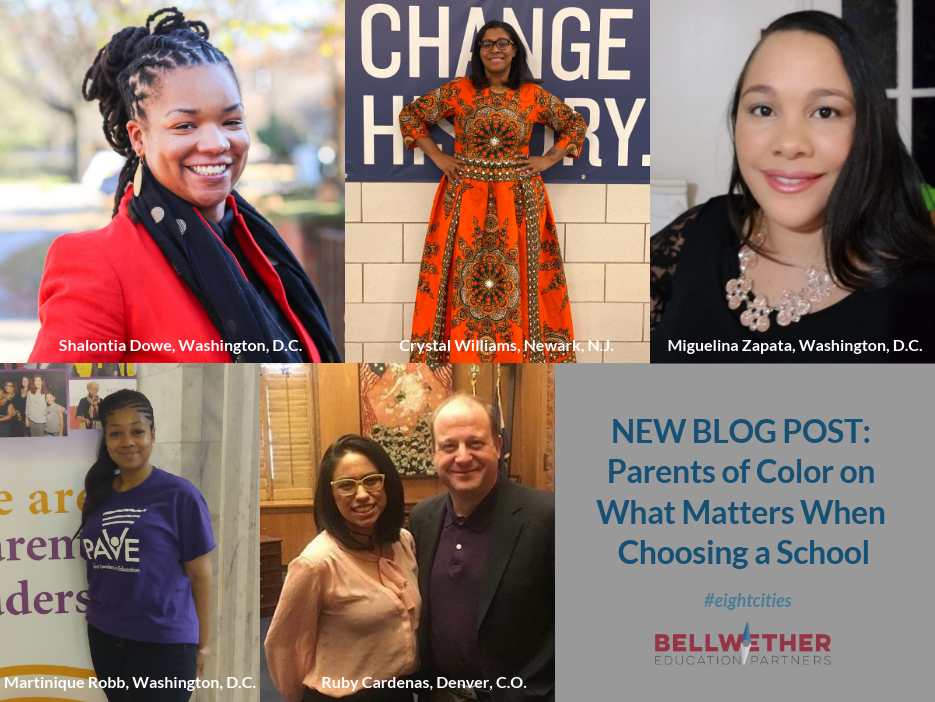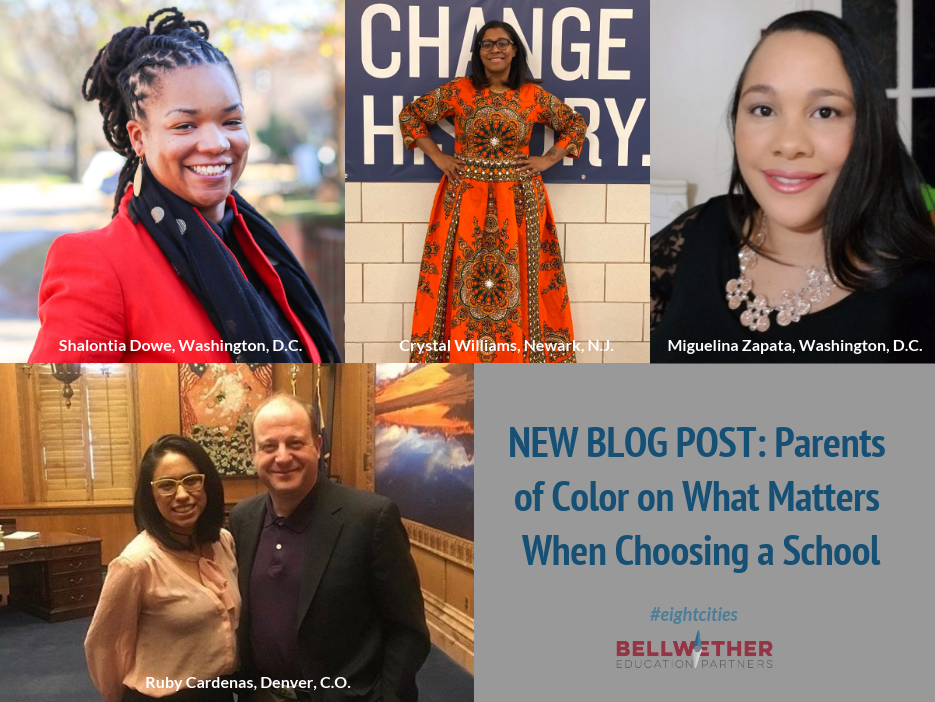This post is part of a series of interviews conducted for our Eight Cities project. Read all related posts here.
Policy conversations around school choice often center on “quality,” defined narrowly by academic measures found on school report cards. But families aren’t always drawn to a school because it’s effective at producing a test score or highly rated on a school performance tool. And for parents of color, there can be tough tradeoffs to make in any school decision.
In advance of the 2020 relaunch of our Eight Cities project, we spoke with nearly a dozen parents of color to understand their decisions, frustrations, and victories. We’ve compiled some of their responses here to provide perspectives on what motivates parents when evaluating multiple school options.

These conversations reveal some of the often unspoken factors that drive school choice. The truth is this process is complicated, and policymakers hoping to create more high-quality seats in cities across the country need to better understand what parents value alongside strong academics and student achievement outcomes.
These quotes have been edited for clarity and condensed.
Miguelina Zapata, a parent leader with D.C. Parents Amplifying Voices in Education (PAVE), describes why a non-traditional school model was important for her and her children:
“Two of my three children are at [a Montessori charter school] here in D.C. I knew my older daughter wouldn’t thrive in a regular school where she would have to sit down for 30 minutes at a time. My daughter is very active and has always been more advanced than other kids her age. I like the Montessori model because they let kids go at their own pace with their own materials depending on what they want to do. She couldn’t get that kind of freedom in a regular school.
I learned about local Montessori schools at the DC bilingual education fair and the annual public school fair and found [two schools] I really liked. But the waitlist numbers were so high for both schools, there was no way we were going to get in. So I applied through the lottery and found my current school.”
Martinique Robb, another D.C. PAVE parent leader, shares her struggle with finding a school for her special needs son:
“The main challenge for me has been trying to find a school that has services for my son who has special needs. It’s hard. We’ve had difficulty with a lot of schools, and I don’t want to put him in a school that’s not going to be right or where he won’t feel comfortable. My son’s not a very verbal person so it’s hard for him to communicate what he needs or what he’s feeling. I constantly have to search for a school that has the appropriate services for him, and a school that will meet all of the conditions laid out in his IEP.”
Parents Crystal Williams of Newark, New Jersey; Ruby Cardenas, a parent leader with Stand for Children in Denver, Colorado; and Shalontia Dowe of D.C. all identified safety as a top priority when searching for a school:
Crystal Williams: “We considered another private school in north Jersey, but [not] because of quality — it was because of safety. [My daughter’s] safety was my number one consideration. I knew I didn’t want my daughter exposed to certain things. I had a classmate get shot when I was in school. I didn’t want that for her.”
Ruby Cardenas: “When we moved back to Denver, I told my husband, ‘you know we’re going to the hood, right?’ I grew up in a neighborhood very similar to this one, and I’m from Denver. I knew [our neighborhood district school] would need help from parents. This sounds stereotypical, but I was concerned about gangs and guns, because these are things that happen in our neighborhood.
But safety is the number one priority for our principal. We can’t control what happens outside the school, but we know that we feel safe when our children are at school. That’s the biggest thing that has given me peace of mind, that our principal wakes up with the kids on his mind, period.”
Shalontia Dowe: “The pros of sending my daughter to the neighborhood school was that she could attend a school closer to home and have more Black teachers, but it was also her first time going through metal detectors and being exposed to a lot of children fighting and other behaviors that aren’t appropriate. Ideally, I’d like to enroll her in a school with a small environment, or something non-traditional [like a micro school].”
Parents Crystal Williams and Shalontia Dowe went on to speak about the importance of psychological safety. Specifically, they sought out schools where their children of color would be accepted and affirmed:
Crystal Williams: “I wanted my daughter to feel safe and loved in whatever school we chose. In our old neighborhood we heard, ‘I can’t be friends with you because you’re black.’ I needed her to come home with her self-esteem intact. We could deal with everything else if she was in a place that was safe and where she didn’t feel less than. Our [current school] fits perfectly. Rigor, homework, she’s not watching TV anymore, and she’s asking me tough questions.”
Shalontia Dowe: “I’m going to pay closer attention to the diversity of the staff when choosing a school because it makes a big difference in how students are treated. My daughter had an experience at [a charter school] here in D.C. where she felt like she was being disciplined more harshly than the white children. This was also the first time she’d been suspended from school. I think that happens when the percentage of Black staff doesn’t align with the percentage of Black students. So a school can claim to be diverse and will accept Black children, but the absence of Black staff and not addressing implicit cultural biases often lead to students of color experiencing adverse disciplinary actions at a disproportionate rate.”
* We have anonymized the schools referenced by interviewees — our goal is to highlight local experiences and allow interviewees to be candid. In the interest of transparency please note that some schools, districts, or networks mentioned have been Bellwether clients. A full list of all our past and current clients is available on our website here.
February 26, 2020
A Q&A With Five Parents of Color on What Matters When Choosing a School
By Bellwether

Share this article